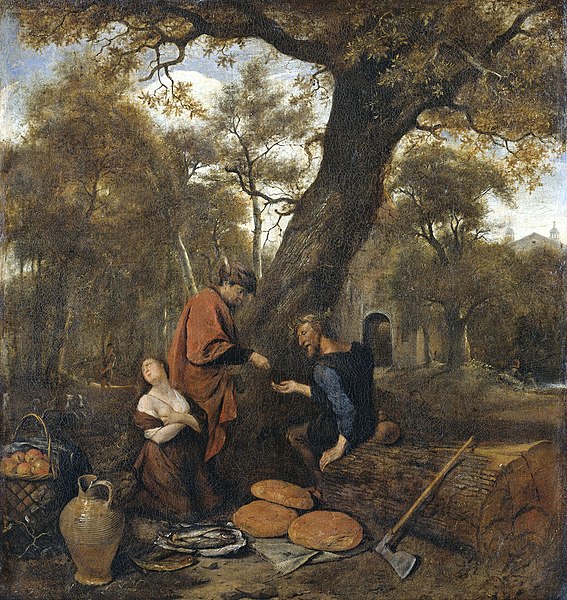ERYSICHTHON IN GREEK MYTHOLOGY
Erysichthon in Greek Mythology
Erysichthon was an impious man spoken of in tales of Greek mythology, a man whose actions managed to anger the goddess Demeter, bringing about his own death.
Erysichthon Son of Triopas
Erysichthon is most commonly said to be a son of Triopas, potentially one of the Heliadae, and Hiscilla, a daughter of Myrmidon. Erysichthon was thus a brother of Phorbas and Iphimedeia. Callimachus calls Erysichthon a king of Thessaly, whilst Ovid, gives no such title to the son of Triopas.
Ovid though would tell of Erysichthon being father to Mestra, who Poseidon once took advantage of.
Ovid though would tell of Erysichthon being father to Mestra, who Poseidon once took advantage of.
Erysichthon and the Grove of DemeterSimilar tales are told by both Callimachus and Ovid, although both give different embellishments to the tale.
Near to where Erysichthon resided (potentially Dotium in Thessaly) was a grove sacred to the goddess Demeter. The grove abounded with every sort of tree, but at its heart was a mighty oak (or poplar). Into the grove came Erysichthon, and his attendants, intent on cutting down the trees to construct a banqueting hall. The oak tree fell beneath the axes of Eryischthon and his men, and with the death of the mighty oak, the dryad associated with it died also. The other dryads then went to Demeter and demanded punishment be given to Erysichthon. Callimachus tells of how Demeter actually came to her sacred grove in disguise when the first axe blow fell, and attempted to dissuade Erysichthon from his action, but yet the son of Triopas continued. In either event, for the desecration of her sacred grove, Demeter did indeed meet out punishment. |
|
The Punishment of Erysichthon
In recognition that the wood from her grove was to be made use of in a banqueting hall, Demeter would make use of Limos, the Greek goddess of hunger, for, from that forth, Erysichthon would suffer insatiable hunger.
From the moment Erysichthon awoke, to the moment he went to sleep, he would be eating, as banquet after banquet was laid before him; and yet the more he ate, the more he craved food. Demeter would also ensure that his nights were also disturbed, for the Oneiroi were sent out, and each night Erysichthon would dream of food and banquets.
Such insatiable hunger, was also said to have been a punishment given to Erysichthon’s father, Triopas, who had destroyed a temple of Demeter in Thessaly to gain building materials for his own house.
From the moment Erysichthon awoke, to the moment he went to sleep, he would be eating, as banquet after banquet was laid before him; and yet the more he ate, the more he craved food. Demeter would also ensure that his nights were also disturbed, for the Oneiroi were sent out, and each night Erysichthon would dream of food and banquets.
Such insatiable hunger, was also said to have been a punishment given to Erysichthon’s father, Triopas, who had destroyed a temple of Demeter in Thessaly to gain building materials for his own house.
Erysichthon and Mestra
|
Banquet after banquet soon saw Erysichthon’s household run out of food, and though he then ate the horses and mules, still Erysichthon remained hungry. Then, Erysichthon sold his own daughter, Mestra, so that he could buy more food.
Mestra did not wish to be owned by anyone, and praying to her former lover Poseidon, she asked for help. Poseidon gave Mestra the ability to change shape, and so she escaped from the man who she had been sold to. When Erysichthon realised that his daughter could change appearance at will, he decided that he could sell her time and time again. |
This money though was soon spent on food, and eventually Erysichthon was so hungry that he began to eat himself, and this it was that his insatiable hunger eventually killed him.
|
|
Colin Quartermain - Erysichthon - 5th February 2020
